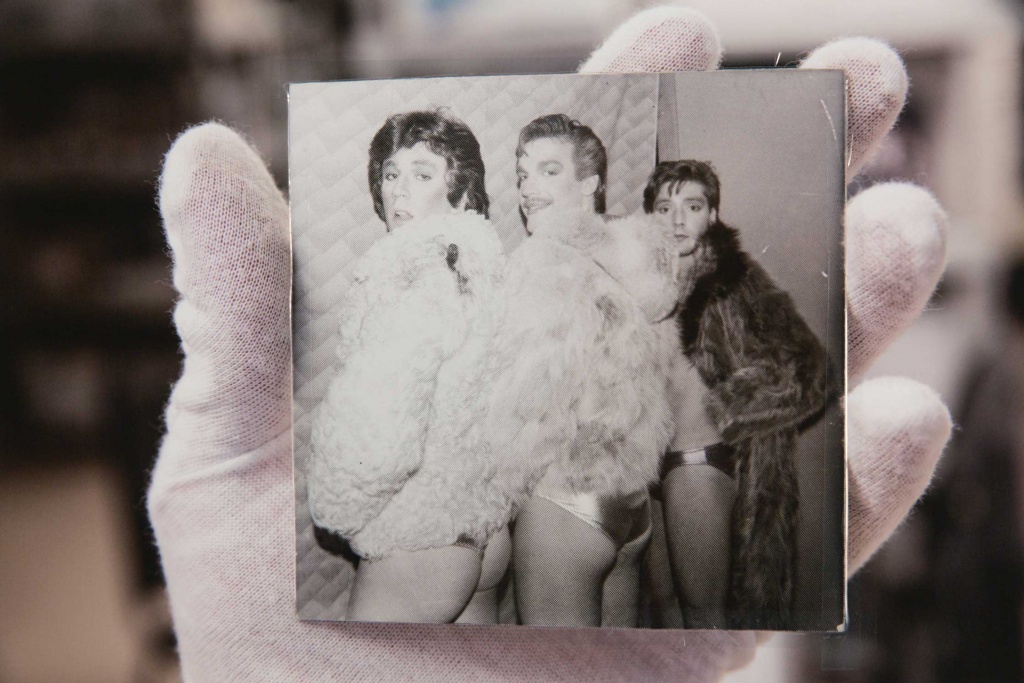In honor of the Stonewall 50 celebration, the William Way LGBT Community Center is presenting a dual exhibition that focuses on the photographic documentation of the history of the LGBTQ movement, both locally and nationally.
Presented in conjunction with the John J. Wilcox Jr. Archives, the dual exhibits pull together literally thousands of images from the Stonewall Riots in 1969 to the present day with images of presidential candidate Pete Buttigieg. Both exhibits are the work of historian Gabriel Martinez.
The larger of the two exhibits, titled “Tonight Is Forever,” takes a national perspective. Martinez took thousands of images from the five decades of the movement (impressively, without any duplications) and transformed them into a type of wallpaper that covers the entire wall of William Way’s main lobby gallery. The images are arranged roughly chronologically, with each time period printed monochromatically with a color from the rainbow flag, each color flowing into the next, just as the years flow from one to the next.
Martinez has also highlighted different radical phrases from each time period to focus on the dominant movement themes from each decade. Those phrases are familiar to anyone who either lived through those times or studied our movement’s history:
“Stop Persecuting Homosexual Citizens”
“Save Our Children from Anita Bryant”
“ERA Yes”
“Ask Tell”
“Silencio = Muerte” (Silence = Death)
The entire exhibit is a truly immersive experience that transports the viewer through a time vortex.
The second exhibit, on display in the adjacent Archive Gallery, is called “LGBTQ Legacies: Art, Archives, Analysis.” This exhibit has a much tighter, local focus, examining the photographs of Harry R. Eberlin.
Eberlin was PGN’s first staff photographer — starting in the mid-1970s — and stayed for almost 20 years. He also worked for other local gay publications of the time, such as “The Gay Alternative” and “The Weekly Philadelphia Gayzette.” During those years, Eberlin was at most community events, political actions and bar parties.
A major purpose of the “Legacies” exhibit is to critically examine the nature of the documentation of movements during the era Eberlin was photographing. Eberlin’s work tended, of course, to reflect the priorities of the editors he worked for, and the fact is that the gay presses in those early days were often not inclusive.
In notes provided by co-curator Michael Carroll, he commented, “Regardless of the reason for it, the glaring disparity in representation of marginalized queers and cis white gay men exemplifies long-standing issues of racism and sexism in Philadelphia’s queer community both then and now.”
Eberlin’s photos still provide a fascinating (albeit narrow) look back at the nascent Philadelphia LGBT community. None of the subjects in the photos are identified. Part of the reason is that much of that information has been lost over the years — historical archiving was not seen with the same importance in the 1970s.
In his notes, Carroll says, “It is inevitable that information is lost over time. Names and dates are forgotten but mementos such as these remain. We are left to piece together a narrative from what artifacts persist to contextualize and preserve their legacy moving forward.”
“Tonight is Forever” is at William Way’s main gallery in the first floor lobby, and is on display through June 28. “Legacies” will be on display in the Archives Gallery, and will run through August 30. For more information, call William Way at 215-732-2220, or visit waygay.org
